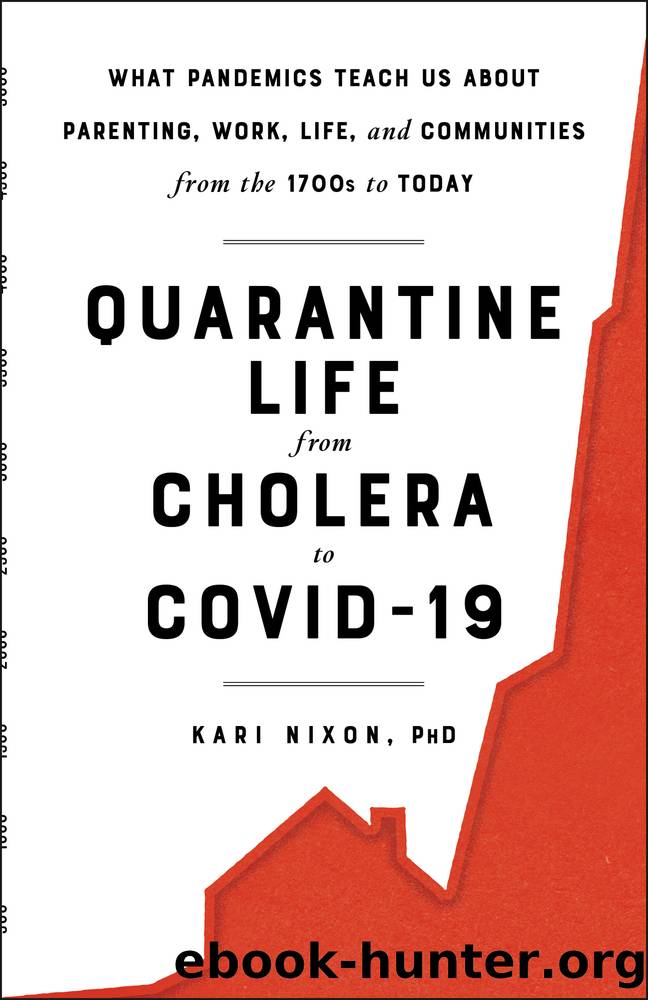Quarantine Life from Cholera to COVID-19 by Kari Nixon

Author:Kari Nixon
Language: eng
Format: epub
Publisher: Tiller Press
Published: 2021-06-15T00:00:00+00:00
LESSON 19:
Public health ethics are a question of personal liberties versus shared rights, but they are first a question of personal versus shared realities.
This last question yields particular insight into the issue plaguing America today: we might portray those who oppose social distancing as MAGA-hat-wearing, gun-toting individualists who are unconcerned with the public good, but what if the healthy carrier narrative is one that fundamentally pits not only two sets of rights but also two sets of lived realitiesâembodied realities, at thatâagainst one another? For the moment, letâs set aside the important issue of economic realities discussed in earlier chapters, issues affecting those who cannot live without the income that leaving their house provides. What of those who simply cannot believe that the evidence of their own individual sensesâtheir own perception of their own bodiesâshould take a back seat to scientific data? Aside from being an ethical dilemma, this is also a public health and scientific communication dilemma of great import to future generations, foreshadowed by the healthy carrier experience of Mary Mallon. Indeed, beginning with Mallonâs case, public health expectations began to âintroduce⦠experts, such as the epidemiologist, who would serve as a mediating role between citizens and the state,â and whose authority individual(istic) Americans were asked to substitute for their own perceptions of their bodies and the environment.6
America is the land of boot-strapping individualism, and that mindset has long extended to expectations that good American citizens look out for their own health (think about the media campaigns you see to go get mammograms or to know the signs of a stroke). Ironically, this grassroots method of trying to keep a large population healthy through self-management and self-monitoring leads us to a predicament in which we suddenly need everyone to do the same thing for public health reasons. First, weâre asking a population steeped in individualistic culture to concern itself with the public goodâfor public rights to supersede individual rights, that is. But second and just as important, weâre asking individuals to believe in a publicly defined reality and not in a personally informed one. In short, weâre asking Americans to suddenly stop doing everything that we generally ask them to do in regard to public health (look after your own body, monitor your own symptoms) and instead urging an about-face (do things to protect other peopleâs bodies, and stop assuming you know what your own body is âtelling youâ).7
In fact, weâre doing more than this: weâre asking individuals to deny a personally informed reality of a self, substituting in its place aggregated data about the global public. This is a tall order, to say the least. Itâs a tension that is more than simply assuming that America, as a whole, cares too little for the public good (as I admittedly often doâI make no exceptions for myself). Science communication and public health ethics can be helpfully informed through the evolving legacy of the healthy carrier narrative, which demonstrates that we must think like those we wish to influence
Download
This site does not store any files on its server. We only index and link to content provided by other sites. Please contact the content providers to delete copyright contents if any and email us, we'll remove relevant links or contents immediately.
| Administration & Medicine Economics | Allied Health Professions |
| Basic Sciences | Dentistry |
| History | Medical Informatics |
| Medicine | Nursing |
| Pharmacology | Psychology |
| Research | Veterinary Medicine |
When Breath Becomes Air by Paul Kalanithi(7253)
Why We Sleep: Unlocking the Power of Sleep and Dreams by Matthew Walker(5636)
Paper Towns by Green John(4163)
The Immortal Life of Henrietta Lacks by Rebecca Skloot(3820)
The Sports Rules Book by Human Kinetics(3581)
Dynamic Alignment Through Imagery by Eric Franklin(3481)
ACSM's Complete Guide to Fitness & Health by ACSM(3459)
Kaplan MCAT Organic Chemistry Review: Created for MCAT 2015 (Kaplan Test Prep) by Kaplan(3418)
Introduction to Kinesiology by Shirl J. Hoffman(3297)
Livewired by David Eagleman(3113)
The River of Consciousness by Oliver Sacks(2988)
Alchemy and Alchemists by C. J. S. Thompson(2908)
The Death of the Heart by Elizabeth Bowen(2895)
Descartes' Error by Antonio Damasio(2728)
Bad Pharma by Ben Goldacre(2722)
The Gene: An Intimate History by Siddhartha Mukherjee(2487)
Kaplan MCAT Behavioral Sciences Review: Created for MCAT 2015 (Kaplan Test Prep) by Kaplan(2483)
The Fate of Rome: Climate, Disease, and the End of an Empire (The Princeton History of the Ancient World) by Kyle Harper(2429)
The Emperor of All Maladies: A Biography of Cancer by Siddhartha Mukherjee(2427)
